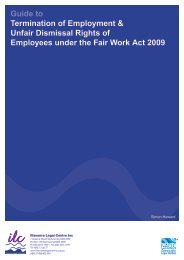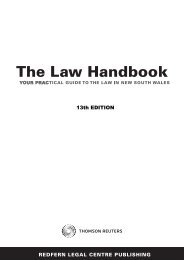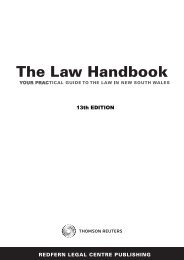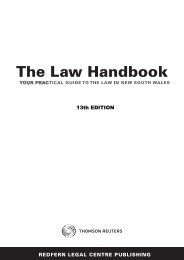Hot Topics - Issue 65: Human Rights - Legal Information Access ...
Hot Topics - Issue 65: Human Rights - Legal Information Access ...
Hot Topics - Issue 65: Human Rights - Legal Information Access ...
Create successful ePaper yourself
Turn your PDF publications into a flip-book with our unique Google optimized e-Paper software.
Origins and sources of <br />
human rights law<br />
the origins of human rights law can be traced<br />
back hundreds of years through developments<br />
in the legal history of many Western countries.<br />
these developments progressively recognised<br />
that human rights are not created or granted,<br />
but are grounded in the basic dignity and<br />
equality of each person.<br />
Pre-TwenTieTH cenTury<br />
Elements of human rights were recognised in the<br />
English law that was brought to Australia in 1788.<br />
In England, the Magna Carta (1215) and the Bill of<br />
<strong>Rights</strong> (1688) are often said to enshrine human rights,<br />
but both deal little with the rights of ordinary people.<br />
They are primarily contracts between the King and<br />
the barons (Magna Carta) or the House of Commons<br />
(the Bill of <strong>Rights</strong>). Nevertheless, they were significant<br />
in the developing recognition of human rights because<br />
they gave some limited rights to particular individuals<br />
against the sovereign.<br />
From the 17th to 19th centuries various treaties between<br />
countries, and declarations within countries, guaranteed<br />
the right of non-discrimination for people according to<br />
their religion, for example:<br />
> Roman Catholics and Protestants in the 1648 Treaty<br />
of Westphalia<br />
> Russian Orthodoxy in Turkey in 1774<br />
> Jews in the 1815 Congress of Vienna.<br />
From statements of human rights such as these, an<br />
international law of human rights started to develop.<br />
The French Declaration of the <strong>Rights</strong> of Man and the<br />
Citizen of 1789 arose out of the French Revolution. It is<br />
a much fuller expression of human rights than is found<br />
in English law. The Declaration, and the ‘Bill of <strong>Rights</strong>’<br />
amendments to the United States Constitution in the<br />
1790s, are the first expressions in law of rights which are<br />
universal in their application to all citizens, not limited<br />
to the aristocracy or Members of Parliament.<br />
These political developments reflected contemporary<br />
political and philosophical thought, both for and against<br />
what were then termed ‘natural rights’, including the<br />
17th century work of Hugo Grotius and John Locke;<br />
Thomas Paine and Edmund Burke in the 18th century;<br />
and Jean-Jacques Rousseau, Jeremy Bentham and John<br />
Stuart Mill in the 19th century.<br />
THe TwenTieTH cenTury<br />
Recognition of human rights on an international scale<br />
came from the two major wars of the 20th century.<br />
Trench warfare and the use of gas in World War I<br />
provoked a desire among nations to regulate weapons<br />
permissible in war. The Paris Peace Conference in 1919<br />
had significance for the development of human rights in<br />
the 20th century through three outcomes:<br />
1. League of nations<br />
The first outcome was the establishment in 1920 of<br />
the League of Nations, which took responsibility<br />
for maintaining international peace. Australia was<br />
among the 20 founding member countries, and<br />
membership expanded to 54. By mutual agreement<br />
(a Covenant), members of the League undertook to<br />
promote fair working conditions for their citizens,<br />
and humane treatment for Indigenous peoples in<br />
colonised countries. The League supervised the<br />
distribution of former German colonies as trust<br />
territories, having regard to the rights of the<br />
Indigenous people. Most importantly perhaps, the<br />
League of Nations initiated the Slavery Convention<br />
1926, to abolish slavery.<br />
As a lasting human rights achievement, the League<br />
of Nations was compromised at the outset by the<br />
refusal of some founding members, including<br />
Australia, to include in the Covenant a commitment<br />
to non-discrimination on the basis of race. Despite<br />
this, and its ultimate failure to avoid another World<br />
War, the League of Nations was a brave experiment<br />
which laid the groundwork for the establishment of<br />
the United Nations in 1945.<br />
origins and sources of human rights law 1
















